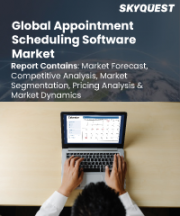
|
시장보고서
상품코드
1820237
약속 일정 소프트웨어 시장 - 규모, 점유율, 동향, 예측 : 유형, 전개 유형, 조직 규모, 최종 이용 산업, 지역별(2025-2033년)Appointment Scheduling Software Market Size, Share, Trends and Forecast by Type, Deployment Type, Organization Size, End Use Industry, and Region, 2025-2033 |
||||||
세계의 약속 일정 소프트웨어 시장 규모는 2024년 4억 390만 달러에 달했습니다. 향후 IMARC Group은 2033년까지 10억 7,032만 달러에 이르고, 2025년부터 2033년까지 10.86%의 연평균 복합 성장률(CAGR)을 보일 것으로 예측했습니다. 현재 북미가 시장을 독점하고 있으며 2024년에는 43.2% 이상의 큰 시장 점유율을 차지했습니다. 자동화 수요 증가, 클라우드 기반 솔루션 채택 증가, AI와 채팅 봇 통합 증가, 고객 참여 전략 강화, 모바일 친화적인 용도 증가, 업계 고유의 맞춤화, 원활한 결제 통합 필요성, 원격 의료 서비스 확대 등이 약속 일정 소프트웨어 시장 점유율에 긍정적인 영향을 미치는 주요 요인입니다.
약속 일정 소프트웨어 시장은 기업의 비즈니스 효율성에 중점을 둡니다. 원격근무와 하이브리드 근무의 확대가 디지털 스케줄링 툴에 의한 가상 약속의 합리화를 촉진해 시장을 활성화시키고 있습니다. 한 산업 보고서에 따르면 세계 근로자의 28%가 원격으로 일하고 있으며 회의 중 88%가 적어도 한 명이 원격으로 참여하고 있다고 합니다. 또한 AI 기반 스케줄링 어시스턴트의 진화가 자동화를 뒷받침하고 예약 경쟁을 줄임으로써 시장 수요를 더욱 밀어 올리고 있습니다. 이 외에도 건강 관리 및 금융 서비스 규정 준수 요구 사항은 안전한 스케줄링 솔루션을 사용하도록 촉구합니다. 이와 더불어 고객과의 상호작용과 개인화된 서비스에 중점을 두는 경향이 강해져 기업은 CRM 기능을 통합한 고급 스케줄링 솔루션에 지출할 수밖에 없어 용도 스케줄링 소프트웨어 시장 성장을 가속하고 있습니다.
미국 시장은 고객 경험 향상에 중점을 두는 경향이 커지고 있으며, 셀프 서비스 예약 기능을 갖춘 약속 일정 소프트웨어를 도입하는 기업이 증가하고 급성장하고 있습니다. 이 외에도 SMS 및 이메일 알림 등 옴니채널 커뮤니케이션에 대한 수요 증가가 통합 스케줄링 플랫폼을 채택하도록 촉구하고 있습니다. 업계 보고서에 따르면 2024년 미국에는 3,480만 개의 중소기업이 있으며 연간 4.5% 증가를 반영하고 있습니다. 중소기업 증가는 약속 일정 소프트웨어와 같은 비용 효율적인 자동화 도구에 대한 절실한 수요로 업무 효율성 향상, 관리 부담 최소화, 고객과의 상호 작용 강화로 이어집니다. 또한 의료 산업에서는 원격 의료 서비스의 도입이 진행되고 있으며 환자의 스케줄 관리가 효율화되고 있습니다. 이 외에도 살롱, 체육관, 컨설팅 회사 등 서비스 산업의 신속한 디지털화가 시장 성장을 가속하고 있습니다.
약속 일정 소프트웨어 시장 동향 :
AI와 자동화의 융합
AI와 자동화는 예약의 정확성을 보장하면서 인간의 노력을 줄이기 위해 약속 일정 소프트웨어 시장 전망을 높이고 있습니다. AI를 활용한 소프트웨어는 24시간 365일 가동하며 사용자는 사람의 손을 번거롭게 하지 않고 직접 약속 일정, 리스케줄, 취소를 할 수 있습니다. 과거 예약 패턴을 분석하고 오버부킹을 피하기 위해 제안된 시간대를 최적화하고 권장합니다. 예측 분석은 기업이 수요를 예측하고 자원을 효율적으로 할당하고 고객 만족도를 높이는 데 도움이 됩니다. 이메일, SMS 및 푸시 알림을 통한 자동 알림은 예약 취소를 줄이고 수익 유지를 개선합니다. 산업 보고서에 따르면 AI 기반 스케줄링 소프트웨어는 자동 알림 및 예측 분석을 사용하여 노쇼를 60% 줄일 수 있습니다. 이것은 AI가 탑재된 채팅봇과 함께 자연 언어 처리를 통해 약속 일정에서 일부 사용자를 지원하며, 더욱 직관적입니다. AI와의 통합으로 약속 일정 소프트웨어는 원활한 예약 관리를 목표로 하는 기업에 중요한 도구가 되고 있습니다.
클라우드 기반 솔루션
클라우드 기반 약속 일정 소프트웨어는 유연성, 접근성 및 비용 효율성에 대한 지지를 받고 있으며 약속 일정 소프트웨어 시장의 큰 동향이 되었습니다. 기존의 On-Premise 시스템과는 달리 이러한 클라우드 솔루션은 인프라 요구 사항이 거의 필요 없으며 유지 보수 비용이 최소화되고 확장성이 저하되지 않습니다. 기업은 이러한 시스템을 CRM, 결제 처리, 커뮤니케이션 도구와 통합하여 원활한 워크플로우를 실현할 수 있습니다. 클라우드 플랫폼은 여러 디바이스와 데이터를 실시간으로 동기화하므로 사용자는 언제 어디서나 일정에 액세스할 수 있습니다. 암호화된 데이터 저장 및 다중 요소 인증과 같은 향상된 보안 조치가 기밀 정보를 보호합니다. 기업은 소프트웨어의 자동 업데이트를 통해 수동으로 작동하지 않고도 최신 기능을 사용할 수 있다는 장점이 있습니다. 업계 보고서에 따르면 클라우드 기반 약속 일정 소프트웨어는 2023년 시장 점유율의 60%를 차지해 그 보급을 반영했습니다. 원격으로 예약을 관리할 수 있으므로 클라우드 기반 스케줄링은 모든 규모의 기업에 선정됩니다.
모바일 최적화
스마트폰 사용이 계속 증가하는 동안 모바일 최적화는 약속 일정 소프트웨어에 필수적입니다. 사용자는 편의성에서 모바일 장치에서 예약, 변경, 취소를 선호합니다. 모바일 친화적인 플랫폼은 직관적인 인터페이스, 푸시 알림 및 실시간 사용 가능 상태를 업데이트하여 사용자 경험을 향상시킵니다. 기업은 위치 기반 스케줄링으로부터 혜택을 누리며 고객은 사용 가능한 가장 가까운 지점에서 서비스를 예약할 수 있습니다. AI를 탑재한 모바일 어시스턴트는 예약 관리를 간소화하고 디지털 지갑과의 통합은 즉시 결제를 용이하게 합니다. 업계 보고서에 따르면 2023년에는 사용자의 55%가 모바일 친화적인 스케줄링 솔루션을 채택하여 모바일 우선 플랫폼에 대한 수요가 증가하고 있습니다. 반응형 디자인, 크로스 디바이스 호환성, 인앱 예약 기능이 더욱 채용을 뒷받침하고 있습니다. 모바일에 최적화된 스케줄링 소프트웨어에 투자하는 기업은 고객 참여를 강화하고 이탈률을 줄이고 전반적인 예약 전환을 늘리고 시장에서 경쟁력을 확보합니다.
목차
제1장 서문
제2장 조사 범위와 조사 방법
- 조사의 목적
- 이해관계자
- 데이터 소스
- 1차 정보
- 2차 정보
- 시장 추정
- 상향식 접근
- 하향식 접근
- 조사 방법
제3장 주요 요약
제4장 소개
제5장 세계 약속 일정 소프트웨어 시장
- 시장 개요
- 시장 실적
- COVID-19의 영향
- 시장 예측
제6장 시장 분석 : 유형별
- 웹 기반(SaaS)
- 모바일 앱
- 기타
제7장 시장 분석 : 전개 유형별
- On-Premise
- 클라우드 기반
제8장 시장 분석 : 조직 규모별
- 중소기업
- 대기업
제9장 시장 분석 : 최종 이용 산업별
- 기업
- 미용 및 건강
- 교육
- 헬스케어
- 기타
제10장 시장 분석 : 지역별
- 북미
- 미국
- 캐나다
- 아시아태평양
- 중국
- 일본
- 인도
- 한국
- 호주
- 인도네시아
- 기타
- 유럽
- 독일
- 프랑스
- 영국
- 이탈리아
- 스페인
- 러시아
- 기타
- 라틴아메리카
- 브라질
- 멕시코
- 기타
- 중동 및 아프리카
제11장 SWOT 분석
제12장 밸류체인 분석
제13장 Porter's Five Forces 분석
제14장 가격 분석
제15장 경쟁 구도
- 시장 구조
- 주요 기업
- 주요 기업 프로파일
- 10to8 Ltd
- Acuity Scheduling Inc.(Squarespace Inc.)
- Appointy Software Inc.
- Melian Labs Inc.
- Mindbody Inc.
- Setmore Appointments
- SimplyBook.me
- Square Inc.
- SuperSaaS
- TimeTrade SilverCloud
The global appointment scheduling software market size was valued at USD 403.90 Million in 2024. Looking forward, IMARC Group estimates the market to reach USD 1,070.32 Million by 2033, exhibiting a CAGR of 10.86% during 2025-2033. North America currently dominates the market, holding a significant market share of over 43.2% in 2024. The growing demand for automation, rising adoption of cloud-based solutions, increasing AI and chatbot integration, enhanced customer engagement strategies, increasing mobile-friendly applications, industry-specific customization, need for seamless payment integration, and expanding telehealth services are some of the key factors positively impacting appointment scheduling software market share.
The market is significantly influenced by the rising focus on operational efficiency in businesses, which is accelerating the need for automated scheduling solutions to reduce administrative workload. The expansion of remote and hybrid work models is prompting organizations to streamline virtual appointments through digital scheduling tools, providing an impetus to the market. According to an industry report, 28% of workers worldwide work remotely, and at least one person participated remotely in 88% of meetings. Moreover, the evolution of AI-based scheduling assistants is boosting automation and reducing booking conflicts, further propelling market demand. Besides this, healthcare and financial services regulatory compliance requirements are compelling the use of secure scheduling solutions. Besides this, the increased emphasis on customer interaction and personalized service is compelling companies to spend on advanced scheduling solutions with in-built CRM capabilities, driving application scheduling software market growth.
The US market is experiencing rapid growth with an increasing focus on enhancing customer experience, compelling businesses to implement appointment scheduling software with self-service booking. Besides this, the increasing demand for omnichannel communication, such as SMS and email reminders, is compelling the adoption of integrated scheduling platforms. As per industry reports, in 2024, there were 34.8 million small enterprises in the U.S., reflecting an annual increase of 4.5%. The increasing number of SMEs is a compelling demand for cost-effective automation tools such as appointment scheduling software to enhance business efficiency, minimize administrative burden, and enhance customer interaction. Moreover, the increasing adoption of telehealth services is compelling in the healthcare industry, allowing for streamlined patient scheduling. Besides this, the swift digitalization of service industries such as salons, gyms, and consulting companies is driving the market growth.
Appointment Scheduling Software Market Trends:
Integration with AI and Automation
AI and automation are enhancing appointment scheduling software market outlook, as it reduces human effort while ensuring the accuracy of the bookings. AI-driven software can operate 24/7, allowing the user to directly schedule, reschedule, or cancel appointments with no human intervention. It analyzes historical booking patterns, optimizes the suggested time slots to avoid overbooking, and gives recommendations. Predictive analytics help businesses anticipate demand, allocate resources efficiently, and enhance customer satisfaction. Automated reminders through emails, SMS, or push notifications reduce missed appointments, improving revenue retention. As per the industrial report, AI-based scheduling software is able to reduce no-shows by 60% using automated reminders and predictive analytics. This, along with AI-powered chatbots, aids some users in scheduling appointments via natural language processing, making it more intuitive. With AI integration, appointment scheduling software is becoming a critical tool for businesses aiming for seamless booking management.
Cloud-Based Solutions
Cloud-based appointment scheduling software is gaining traction because of its flexibility, accessibility, and cost-effectiveness, which is a significant appointment scheduling software market trend. Unlike traditional on-premises systems, these cloud solutions practically eliminate infrastructure requirements, and costs are also minimized in maintenance and do not compromise the high levels of scalability. Businesses can integrate these systems with CRM, payment processing, and communication tools for a seamless workflow. Cloud platforms provide real-time synchronization of data with multiple devices whereby users can enjoy accessing their schedules anywhere and anytime. Enhanced security measures, including encrypted data storage and multi-factor authentication, protect sensitive information. Companies benefit from automatic software updates, ensuring that they always have the latest features without manual intervention. According to an industry report, cloud-based appointment scheduling software accounted for 60% of the market share in 2023, reflecting its widespread adoption. The ability to manage bookings remotely makes cloud-based scheduling a preferred choice for businesses of all sizes.
Mobile Optimization
As smartphone usage continues to grow, mobile optimization has become essential for appointment-scheduling software. Users prefer booking, modifying, and canceling appointments on mobile devices for convenience. Mobile-friendly platforms feature intuitive interfaces, push notifications, and real-time availability updates, enhancing the user experience. Businesses benefit from location-based scheduling, allowing customers to book services at the nearest available branch. AI-powered mobile assistants streamline appointment management, while integration with digital wallets facilitates instant payments. According to an industry report, 55% of users adopted mobile-friendly scheduling solutions in 2023, underlining the demand for mobile-first platforms. Responsive design, cross-device compatibility, and in-app booking capabilities further drive adoption. Companies investing in mobile-optimized scheduling software enhance customer engagement, reduce drop-off rates, and increase overall appointment conversions, ensuring a competitive edge in the market.
Appointment Scheduling Software Industry Segmentation:
Analysis by Type:
- Web-base (SaaS)
- Mobile App
- Others
Web-base (SaaS) leads the market with around 63.5% of market share in 2024 due to its availability, scalability, and cost-effectiveness. The businesses are provided with the advantage that the implementation of SaaS solutions eliminates the need for on-premises infrastructure and provides access to cloud-based means from anywhere. This type of software aids different industries-from healthcare to retail and professional services with appointment scheduling-imposing real-time booking, automated reminders, and calendar synchronization. Integration with CRM, payment gateways, and communication tools helps streamline operations further. The flexibility in subscription plans allows consumers to use the services while paying lesser upfront costs with the latest software and security improvements. The increasing acceptance of digital solutions particularly among SMEs-drive the demand in the market. As businesses increasingly embrace automation with customer engagement, growth will remain in SaaS-based scheduling platforms, increasingly powered by AI, analytics, and API integrations that improve overall user experience.
Analysis by Deployment Type:
- On-premises
- Cloud-based
On-premises deployment provides organizations with direct control over their appointment scheduling software, offering enhanced security and customization. Businesses with strict data privacy regulations, such as healthcare and finance, prefer this model to maintain compliance and protect sensitive client information. Although initial setup costs, including infrastructure and maintenance, are higher, long-term operational stability and data ownership make it a viable option for enterprises with large-scale scheduling needs. Companies with legacy systems or extremely complex integrations get an extra advantage from on-premises solutions by streamlining the operation further since it is not built on other external service providers.
Cloud-based deployment offers flexibility, scalability, and cost-effectiveness for businesses seeking streamlined appointment scheduling solutions. Small and medium-sized enterprises, along with service-based industries, favor this model for its low upfront investment, automatic updates, and remote accessibility. Cloud options make it possible for customers to initiate their appointments in real time with reminders while away from the office and available on mobile for connection. Cloud solutions also secure data during processes because of advanced control and support and reduce IT expenses. Integration with CRM, payment gateways, and third-party applications further enhances operational efficiency, making it the preferred choice for businesses prioritizing agility and digital transformation.
Analysis by Organization Size:
- Small and Medium Enterprises
- Large Enterprises
Large enterprises lead the market with around 58.6% of market share in 2024 driven by the need for greater operational efficiency, improved customer relationship management, and automated scheduling processes. Sectors such as healthcare, retail, finance, and corporate services require strong solutions that can manage large volumes of appointments, scheduling across multiple locations, and complex workflows. Operational efficiency and customer engagement require advanced capabilities such as AI-powered analytics, automated reminders, CRM integration, and role-based access control. Large enterprises are concerned about security, compliance, and customizability; therefore, they tend to purchase enterprise-grade solutions with scalable infrastructure. Most organizations are migrating to cloud-based deployment methods, but some sectors are still adopting on-premises solutions for greater control over data. The major focus is placed on digital transformation, workforce optimization, and AI-driven automation, fueling the widespread adoption of appointment scheduling software in large enterprises.
Analysis by End Use Industry:
- Corporate
- Beauty and Wellness
- Education
- Healthcare
- Others
Corporate leads the market with around 45.0% of market share in 2024. It enhances operational efficiency, optimized workforce management, and better client handling. Such software finds applications among businesses in consulting, legal, finance, and IT services for meeting coordination, reducing scheduling conflicts, and automating reminders. Calendar synchronization, video conferencing integrations, and AI-assisted scheduling are features that empower enterprises to seamlessly set up internal meetings, client appointments, and interviews. There is an increasing preference for cloud-based solutions, with their flexibility, remote accessibility, and scalability allowing enterprises to manage appointments across locations. Security of data and compliance are issues of significance; therefore, some corporations wish to deploy their solutions on-premises. Amidst growing remote work and hybrid office models, appointment scheduling software allows organizations to ensure smooth collaboration, better resource utilization and enhanced operational efficiency. The growing emphasis on digital transformation and automation continues to spur corporate demand for advanced scheduling solutions.
Regional Analysis:
- North America
- United States
- Canada
- Asia Pacific
- China
- Japan
- India
- South Korea
- Australia
- Indonesia
- Others
- Europe
- Germany
- France
- United Kingdom
- Italy
- Spain
- Russia
- Others
- Latin America
- Brazil
- Mexico
- Others
- Middle East and Africa
In 2024, North America accounted for the largest market share of over 43.2% due to high digital adoption, strong corporate sector presence, and increased automation demand. Major established industries in North America, such as healthcare, finance, retail, and IT, now count on scheduling software to improve their operations, engage customers better, and facilitate workforce efficiency. The cloud-based system and SaaS model are fuelling market growth, with businesses demanding remote accessibility, real-time scheduling, and seamless integration with their CRM and communication tools. Regulatory compliance requirements in industries such as healthcare and finance are also driving the demand for secure and customizable scheduling solutions. The prevailing hybrid work model trend, along with telehealth services, is accelerating adoption even further. With the rapid maturity of AI, machine learning, and data analytics, North America is also poised to lead the innovation and growth of this market.
Key Regional Takeaways:
United States Appointment Scheduling Software Market Analysis
The United States holds a substantial share of the North American appointment scheduling software market at 88.70% in 2024. The U.S. appointment scheduling software industry is constantly growing, fuelled by increasing demand in the healthcare, education, and corporate sectors. As per the U.S. Department of Health and Human Services, over 1.2 billion healthcare visits took place in 2023, adding significantly to the need for appointment scheduling solutions. The healthcare industry is the most prominent end-user with high adoption due to the requirement for simplified patient management. Greater utilization of cloud-based technologies and artificial intelligence (AI) driven automation tools further accelerates market growth. Telehealth integration, automated reminders, and support across multiple platforms are provided by major players such as Zocdoc and Acuity Scheduling. With business and healthcare organizations increasingly looking at enhancing operational efficiency, the adoption of appointment scheduling software is likely to keep growing further. Federal support for digital healthcare solutions, including the 21st Century Cures Act, will also fuel market growth further.
Europe Appointment Scheduling Software Market Analysis
Europe's scheduling software market for appointments is seeing robust growth due to the increasing digitalization of healthcare and service sectors. As per the European Commission's Digital Economy and Society Index (DESI) 2023 report, more than 80% of citizens in the EU have used the Internet to consult healthcare services, indicating the increased need for digital solutions. Countries such as Germany, the UK, and France have put digital transformation in the health sector at the top of their agenda, which has led to the growth of the appointment scheduling software market in the region. The rising demand for telemedicine and effective customer care in sectors such as beauty and retail are also a significant growth-inducing factors for the market. Artificial intelligence (AI) integration helps with personalized scheduling and also fuels the popularity of the software. Data privacy laws like GDPR influence the market, which also results in software vendors emphasizing secure solutions to address these requirements.
Asia Pacific Appointment Scheduling Software Market Analysis
The Asia Pacific appointment scheduling software market is growing at a fast pace with the digitalization of healthcare, retail, and professional services. As per an industrial report, as of 2022, China had around 1.04 billion smartphone users, and India had around 659 million, which is a major contributor to the demand for digital scheduling solutions. The growing internet penetration in these nations is driving the use of appointment scheduling software, especially in telemedicine. The rise of mobile commerce and digital payments is fueling demand for scheduling solutions integrated with e-wallets and messaging platforms such as WeChat and WhatsApp. Also, the increasing emphasis on customer experience and operational efficiency in companies in the region further fuels appointment scheduling software market demand. Strategic collaborations between domestic and foreign players, like the partnership between Bharat Dynamics and international companies, also promote innovation. Domestic companies and healthcare providers are increasingly adopting appointment scheduling software to improve operational efficiency and customer satisfaction.
Latin America Appointment Scheduling Software Market Analysis
Latin America's market for appointment scheduling software is expanding with the adoption of digital technologies in healthcare, retail, and services. Brazil and Mexico are the leading markets, with businesses investing in cloud-based scheduling solutions to streamline operations. Brazil had around 213 million mobile cellular subscriptions in December 2023, as per World Bank data, significantly fuelling demand for mobile-enabled scheduling solutions. Moreover, the healthcare sector of the region is growing, with the government of Brazil increasing expenditure on digital health initiatives, thus increasing demand for scheduling software even more. The deregulation of gun licensing rules and the increase in digital health consultations have also helped sustain this trend. Players like SuperSaaS and Appointy are taking advantage of the digital boom in the region, providing easy-to-use appointment management solutions. The implementation of favorable government initiatives and continuous efforts to enhance healthcare access are also promoting innovation and digital scheduling adoption.
Middle East and Africa Appointment Scheduling Software Market Analysis
The Middle East and Africa appointment scheduling software market is growing, supported by the healthcare and service industry's digital transformation. As per the UAE Government, health spending in the country amounted to AED 4.25 Billion (about USD 1.16 Billion) in 2022, supporting the increasing demand for digital health solutions such as appointment scheduling software. In Saudi Arabia, the government's Vision 2030 vision to modernize the healthcare sector is further augmenting demand for such software. In Africa, nations such as South Africa are also augmenting digital adoption across both the healthcare and other service sectors. Growing internet connectivity and increased digital infrastructure are also aiding the growth of the market, helping regional businesses optimize processes. Also, the banking and financial services sector in the region is integrating appointment booking tools with customer service platforms to enhance accessibility. As demand for safe, effective appointment scheduling solutions increases, appointment scheduling software is increasingly becoming a part of the region's digitalization campaign.
Competitive Landscape:
The competition in the market is characterized by advancements in technology, integrations, and niche solutions for various industries. Companies in the appointment scheduling software market have been setting themselves apart through AI automation capabilities, cloud deployment options, mobile accessibility, and such ability to integrate various third-party systems seamlessly. Value-added features such as real-time availability, automated reminders, and analytics tools provide efficiency and enhanced adoption in sectors such as healthcare, retail, and professional services. Also, customization is a key component, as vendors tailor solutions to various business needs. Subscription pricing, freemium plans, and enterprise-level pricing plans further fuel the competition. Strategic partnerships with other tech firms, mergers, and acquisitions tend to define the competition as these are mechanisms through which companies expand their portfolios and geographic reach. Furthermore, constant innovations in product offerings, including AI scheduling, voice booking, and machine learning (ML) recommendations, define the competitive landscape of the market.
The report provides a comprehensive analysis of the competitive landscape in the appointment scheduling software market with detailed profiles of all major companies, including:
- 10to8 Ltd
- Acuity Scheduling Inc. (Squarespace Inc.)
- Appointy Software Inc.
- Melian Labs Inc.
- Mindbody Inc.
- Setmore Appointments
- SimplyBook.me
- Square Inc.
- SuperSaaS
- TimeTrade SilverCloud.
Key Questions Answered in This Report
- 1.How big is the appointment scheduling software market?
- 2.What is the future outlook of the appointment scheduling software market?
- 3.What are the key factors driving the appointment scheduling software market?
- 4.Which region accounts for the largest appointment scheduling software market share?
- 5.Which are the leading companies in the global appointment scheduling software market?
Table of Contents
1 Preface
2 Scope and Methodology
- 2.1 Objectives of the Study
- 2.2 Stakeholders
- 2.3 Data Sources
- 2.3.1 Primary Sources
- 2.3.2 Secondary Sources
- 2.4 Market Estimation
- 2.4.1 Bottom-Up Approach
- 2.4.2 Top-Down Approach
- 2.5 Forecasting Methodology
3 Executive Summary
4 Introduction
- 4.1 Overview
- 4.2 Key Industry Trends
5 Global Appointment Scheduling Software Market
- 5.1 Market Overview
- 5.2 Market Performance
- 5.3 Impact of COVID-19
- 5.4 Market Forecast
6 Market Breakup by Type
- 6.1 Web-base (SaaS)
- 6.1.1 Market Trends
- 6.1.2 Market Forecast
- 6.2 Mobile App
- 6.2.1 Market Trends
- 6.2.2 Market Forecast
- 6.3 Others
- 6.3.1 Market Trends
- 6.3.2 Market Forecast
7 Market Breakup by Deployment Type
- 7.1 On-premises
- 7.1.1 Market Trends
- 7.1.2 Market Forecast
- 7.2 Cloud-based
- 7.2.1 Market Trends
- 7.2.2 Market Forecast
8 Market Breakup by Organization Size
- 8.1 Small and Medium Enterprises
- 8.1.1 Market Trends
- 8.1.2 Market Forecast
- 8.2 Large Enterprises
- 8.2.1 Market Trends
- 8.2.2 Market Forecast
9 Market Breakup by End Use Industry
- 9.1 Corporate
- 9.1.1 Market Trends
- 9.1.2 Market Forecast
- 9.2 Beauty and Wellness
- 9.2.1 Market Trends
- 9.2.2 Market Forecast
- 9.3 Education
- 9.3.1 Market Trends
- 9.3.2 Market Forecast
- 9.4 Healthcare
- 9.4.1 Market Trends
- 9.4.2 Market Forecast
- 9.5 Others
- 9.5.1 Market Trends
- 9.5.2 Market Forecast
10 Market Breakup by Region
- 10.1 North America
- 10.1.1 United States
- 10.1.1.1 Market Trends
- 10.1.1.2 Market Forecast
- 10.1.2 Canada
- 10.1.2.1 Market Trends
- 10.1.2.2 Market Forecast
- 10.1.1 United States
- 10.2 Asia-Pacific
- 10.2.1 China
- 10.2.1.1 Market Trends
- 10.2.1.2 Market Forecast
- 10.2.2 Japan
- 10.2.2.1 Market Trends
- 10.2.2.2 Market Forecast
- 10.2.3 India
- 10.2.3.1 Market Trends
- 10.2.3.2 Market Forecast
- 10.2.4 South Korea
- 10.2.4.1 Market Trends
- 10.2.4.2 Market Forecast
- 10.2.5 Australia
- 10.2.5.1 Market Trends
- 10.2.5.2 Market Forecast
- 10.2.6 Indonesia
- 10.2.6.1 Market Trends
- 10.2.6.2 Market Forecast
- 10.2.7 Others
- 10.2.7.1 Market Trends
- 10.2.7.2 Market Forecast
- 10.2.1 China
- 10.3 Europe
- 10.3.1 Germany
- 10.3.1.1 Market Trends
- 10.3.1.2 Market Forecast
- 10.3.2 France
- 10.3.2.1 Market Trends
- 10.3.2.2 Market Forecast
- 10.3.3 United Kingdom
- 10.3.3.1 Market Trends
- 10.3.3.2 Market Forecast
- 10.3.4 Italy
- 10.3.4.1 Market Trends
- 10.3.4.2 Market Forecast
- 10.3.5 Spain
- 10.3.5.1 Market Trends
- 10.3.5.2 Market Forecast
- 10.3.6 Russia
- 10.3.6.1 Market Trends
- 10.3.6.2 Market Forecast
- 10.3.7 Others
- 10.3.7.1 Market Trends
- 10.3.7.2 Market Forecast
- 10.3.1 Germany
- 10.4 Latin America
- 10.4.1 Brazil
- 10.4.1.1 Market Trends
- 10.4.1.2 Market Forecast
- 10.4.2 Mexico
- 10.4.2.1 Market Trends
- 10.4.2.2 Market Forecast
- 10.4.3 Others
- 10.4.3.1 Market Trends
- 10.4.3.2 Market Forecast
- 10.4.1 Brazil
- 10.5 Middle East and Africa
- 10.5.1 Market Trends
- 10.5.2 Market Breakup by Country
- 10.5.3 Market Forecast
11 SWOT Analysis
- 11.1 Overview
- 11.2 Strengths
- 11.3 Weaknesses
- 11.4 Opportunities
- 11.5 Threats
12 Value Chain Analysis
13 Porters Five Forces Analysis
- 13.1 Overview
- 13.2 Bargaining Power of Buyers
- 13.3 Bargaining Power of Suppliers
- 13.4 Degree of Competition
- 13.5 Threat of New Entrants
- 13.6 Threat of Substitutes
14 Price Analysis
15 Competitive Landscape
- 15.1 Market Structure
- 15.2 Key Players
- 15.3 Profiles of Key Players
- 15.3.1 10to8 Ltd
- 15.3.1.1 Company Overview
- 15.3.1.2 Product Portfolio
- 15.3.2 Acuity Scheduling Inc. (Squarespace Inc.)
- 15.3.2.1 Company Overview
- 15.3.2.2 Product Portfolio
- 15.3.3 Appointy Software Inc.
- 15.3.3.1 Company Overview
- 15.3.3.2 Product Portfolio
- 15.3.4 Melian Labs Inc.
- 15.3.4.1 Company Overview
- 15.3.4.2 Product Portfolio
- 15.3.5 Mindbody Inc.
- 15.3.5.1 Company Overview
- 15.3.5.2 Product Portfolio
- 15.3.6 Setmore Appointments
- 15.3.6.1 Company Overview
- 15.3.6.2 Product Portfolio
- 15.3.7 SimplyBook.me
- 15.3.7.1 Company Overview
- 15.3.7.2 Product Portfolio
- 15.3.8 Square Inc.
- 15.3.8.1 Company Overview
- 15.3.8.2 Product Portfolio
- 15.3.8.3 Financials
- 15.3.9 SuperSaaS
- 15.3.9.1 Company Overview
- 15.3.9.2 Product Portfolio
- 15.3.10 TimeTrade SilverCloud
- 15.3.10.1 Company Overview
- 15.3.10.2 Product Portfolio
- 15.3.1 10to8 Ltd



















